Home » 2007 » Art in Antarctica » Art in Antarctica: About
Miami artist Xavier Cortada, a recipient of the 2006-2007 National Science Foundation’s Antarctic Artists and Writers Program, traveled to Antarctica during December 28, 2006 – January 12, 2007 to implement various art projects.
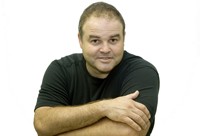 Cortada planted 51 flags –and an ice replica of a mangrove seedling– on a moving glacier to mark the passage of time; created a collaborative mural with scientists who work there; painted a portrait of Sir Ernest Shackleton for the South Pole (permanently placing the famed explorer in the place that eluded him in life); and placed flags for endangered animals from each time zone around the South Pole. Cortada also used 12 pairs of black shoes to create an installation at the South Pole expressing the environmental concerns of people living in the world above
Cortada planted 51 flags –and an ice replica of a mangrove seedling– on a moving glacier to mark the passage of time; created a collaborative mural with scientists who work there; painted a portrait of Sir Ernest Shackleton for the South Pole (permanently placing the famed explorer in the place that eluded him in life); and placed flags for endangered animals from each time zone around the South Pole. Cortada also used 12 pairs of black shoes to create an installation at the South Pole expressing the environmental concerns of people living in the world above
The purpose of the NSF Antarctic Artists and Writers Program is to enable serious writings and works of art that exemplify the Antarctic heritage of humankind. In particular, the program seeks to increase public understanding of the Antarctic region, including the continent and the surrounding oceans, as well as the associated research and education endeavors.
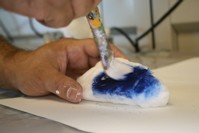 Through his fellowship in Antarctica, Cortada strived to create art in Antarctica to demonstrate how interconnected we as people are to each other and to our planet. As such, the artist’s explorations included environmental concerns and how time passes through us. He created site-specific installations, sketched, and painted, photographed and videotaped, as well as conducted interviews and documented scientist’s work in Antarctica.
Through his fellowship in Antarctica, Cortada strived to create art in Antarctica to demonstrate how interconnected we as people are to each other and to our planet. As such, the artist’s explorations included environmental concerns and how time passes through us. He created site-specific installations, sketched, and painted, photographed and videotaped, as well as conducted interviews and documented scientist’s work in Antarctica.
Art in Antarctica involved the creation, installation and documentation of several site-specific series of projects in the McMurdo Station and South Pole Amundsen-Scott Station, including:
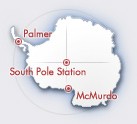
- The 150,000-year Journey
- The Markers
- The Longitudinal Installation
- Endangered World
- Antarctic Mural Project, and the
- Ice Paintings
Composer and sound-artist Juan Carlos Espinosa will accompany the artist to assist with the mural/installations at the stations, set-up and document the conceptual art pieces, and create a musical pieces using the recorded samplings of sound from all processes. Dr. Espinosa’s music, along with Cortada’s digital video, photographs, sketches, and writings will be displayed at the project exhibit.
ON EXHIBIT
In September 2007, works created during the residency will be exhibited at the Boulder Museum of Contemporary Art in “Weather Report: Art & Climate Change,” a group show curated by Lucy Lippard.
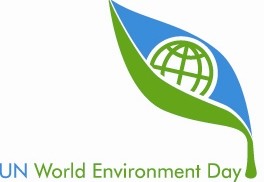 In June 2007, Xavier Cortada’s “Longitudinal Installation” (created during this residency) will be exhibited in Oslo for UN World Environment Day 2007, in an exhibit the Natural World Museum is producing in partnership with the United Nations Environment Programme.
In June 2007, Xavier Cortada’s “Longitudinal Installation” (created during this residency) will be exhibited in Oslo for UN World Environment Day 2007, in an exhibit the Natural World Museum is producing in partnership with the United Nations Environment Programme.
This traveling exhibition addresses the theme of Climate Change from a global perspective – the melting and thawing of ice, snow and permafrost are environment-altering changes taking place around the world- from the Andes to the Himalayas to the melting ice caps of the Poles. The exhibit tour includes the following venues:
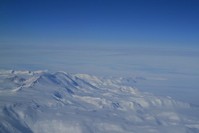 Nobel Peace Center
Nobel Peace Center
Oslo, Norway
June 5 – August 20, 2007
http://www.nobelpeacecenter.org/
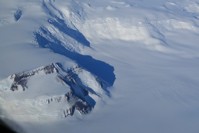 BOZAR Centre for Fine Arts
BOZAR Centre for Fine Arts
Brussels, Belgium
October 6, 2007 – January 6, 2008
http://www.bozar.be/
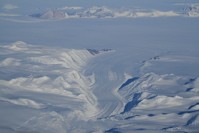 Ministry of Culture
Ministry of Culture
Monaco
February – March 2008
http://www.gouv.mc/
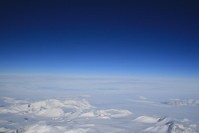 Field Museum
Field Museum
Chicago, United States
April – September 2008
http://www.fieldmuseum.org/